跨文化交际Unit 4课件
Unit 4-跨文化课件
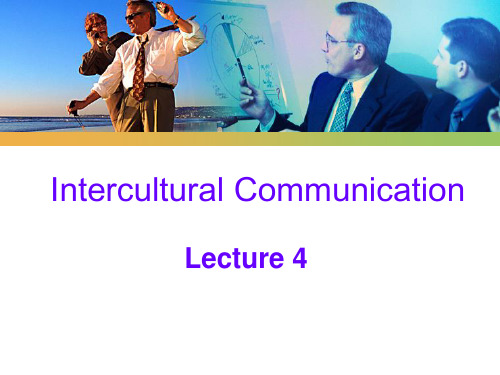
Culture shock
Case study
• Wen Hong had an American professor in her economics class in China. She had given the professor a lot of help during the course. At the end of the semester,the professor and his wife invited her to their home for dinner. They said they were going to cook her an American meal. • Wen Hong felt very flattered and excited,since McDonald,KFC and Pizza Hut had been her only exposure to Western cooking. • They had salad to start with,then steak with potatoes,followed by ice cream. Wen Hong had expected more courses but the meal came to an end. She knew the professor and his wife were being kind to her,but somehow she was a little disappointed. She wondered whether Americans do eat like that ice
It refers to negative attitudes towards other people that are based on faulty and inflexible stereotypes. It is an unfair, biased, or intolerant attitude towards another group of people.
跨文化交际Unit4
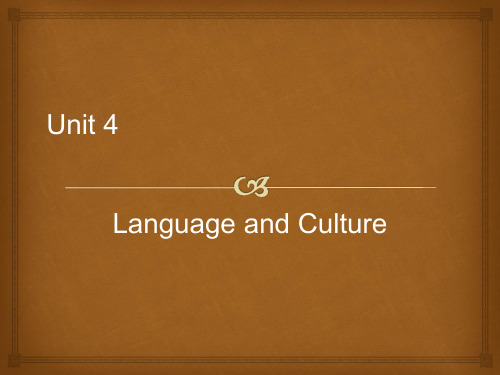
பைடு நூலகம்
More examples
“Why time flies?”
“Because somebody wants to kill it.” “你有什么了不起,能把我吃了!”
“不能,我是回民!” 外甥打灯笼照(舅)旧
Language = neutral codes and grammatical rules? We make cultural choices when we select words,
form sentences and send a message. All languages have social questions and information
as before; as usual; as of old 狗撵鸭子呱呱叫
very good
More examples
恋爱“三草”原则: 女:你说你很寂寞,为什么不去找你以前的女朋友而来追我
呢?
男:好马不吃回头草!(A good horse will never turn round to graze on an old pasture.)
meaning comes out of the context, the cultural usage.
Reading I How Is Language Related to Culture
Language reflects the environment in which we live. (snow, wine)
More examples
I am sorry. I am sorry, too. I am sorry three. What are you sorry for (four)? I am sorry five.
跨文化交际Unit 4课件
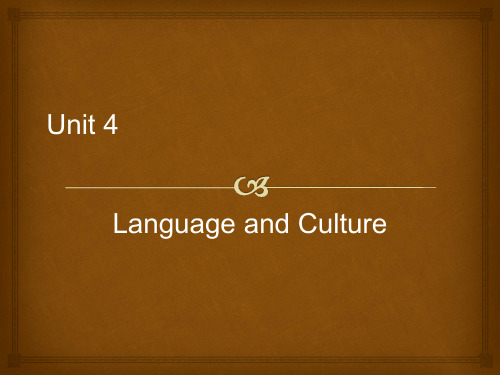
Reading I How Is Language Related to Culture
打落水狗, 斗鸡走狗, 狗恶 酒酸, 狗吠不惊, 狗急跳墙, 狗头军师, 狗血喷头, 狗眼 看人, 狗仗人势, 狗嘴里吐 不出象牙, 挂羊头、卖狗肉, 关门打狗, 狐朋狗友, 鸡鸣 狗吠, 嫁鸡随鸡、嫁狗随狗, 狼心狗肺, 鼠窃狗盗, 偷鸡 摸狗, 指鸡骂狗, 猪卑狗险, 狗皮膏药, 狗走狐淫, 丧家 之狗, 狗行狼心, 狗胆包女:你说你很寂寞,为什么不去找你以前的女朋友而来追我 呢? 男:好马不吃回头草!(A good horse will never turn round to graze on an old pasture.) 女:你们班上也有女孩呀!我们俩相隔这么远,为何来追我 呢? 男:兔子不吃窝边草!(A rabbit doesn„t nibble the grass near its own hole.) 女:那你现在为什么又要抛弃我呢?你这个混蛋! 男:天涯何处无芳草!(There are plenty of fish in the sea.)
“Language-and-culture” in the five dimensions of culture
Language and cultural products Language and cultural practices Language and cultural perspectives Language and cultural communities Language and persons
More examples
More examples
I am sorry. I am sorry, too. I am sorry three. What are you sorry for (four)? I am sorry five.
跨文化交际第四课.ppt

5. Westerners can understand what Uncle policeman or PLA Uncle means.
2021/4/1
6. We can address Jason Douglas, who is a lawyer, as Lawyer Douglas.
With Miss Mary the use of the given name indicates friendliness. With Brown the lack of a title indicates friendliness.
2021/4/1
4. Ranks in the armed forces like Captain, Colonel can be used as titles.
2021/4/1
2021/4/1
美国人乐善好施,爱打抱不平,个 性耿直,很容易交朋友。他们总是 先相信人,然而一旦他们觉得那人 有误,不管谁是谁非,说翻脸马上 翻脸,容不得他有解释的余地。但 如果事后他意识到是自己误会了, 他会很诚恳地向你道歉,没有面子 不面子的顾虑。
2021/4/1
谨防被认为同性恋 Man don't hold hands & woman don't hold hands in America
在社交距离范围内,已经没有直接的 身体接触,说话时,也要适当提高声音, 需要更充分的目光接触。如果谈话者得不 到对方目光的支持,他(或她)会有强烈的 被忽视、被拒绝的感受。这时,相互间的 目光接触已是交谈中不可缺免的感情交流 形式了。
2021/4/1
4、公众距离。12~25英尺(约 3.7~7.6米)这是公开演说时演 说者与听众所保持的距离。这 是一个几乎能容纳一切人的 “门户开放”的空间,人们完 全可以对处于空间的其他人, “视而不见”,不予交往,因 为相互之间未必发生一定联系。 因此,这个空间的交往,大多 是当众演讲之类。
跨文化交际课件Unit 4
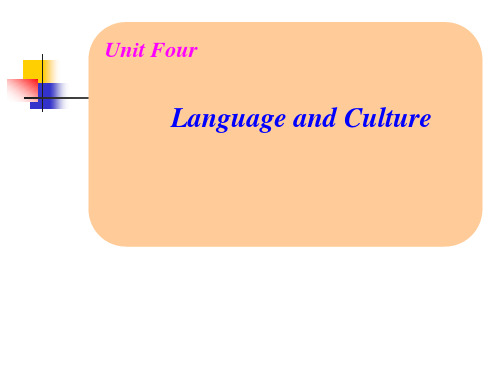
Language and Culture
A: Why couldn’t Cinderella be a good soccer player? B: She lost her shoe, she ran away from the ball, and her coach was a pumpkin.
references\一封信(colors).doc
Chinese Zodiac
mouse
ox
tiger
rabbit
dragon
snake
Chinese Zodiac
horse
sheep
monkey
rooster
dog
pig
Animal
mouse
Chinese
disgust, timid, dirty, smart and agile (敏捷)
tiger
ferocity(凶猛)
rabbit
dragon snake
cute and tameபைடு நூலகம்
majesty(威严;权威) harmful
lovely, reproductive (生殖、再生的)
evil evil
Animal
horse
Chinese
success/ devotion/ hardworking docile(温顺的) and
English
devotion/hardworking/ beauty, strength
sheep
monkey rooster dog pig
weak
clever, agile(机敏的) and a little impatient prostitute humble stupid, lazy, dirty
跨文化交际课件 Unit Four
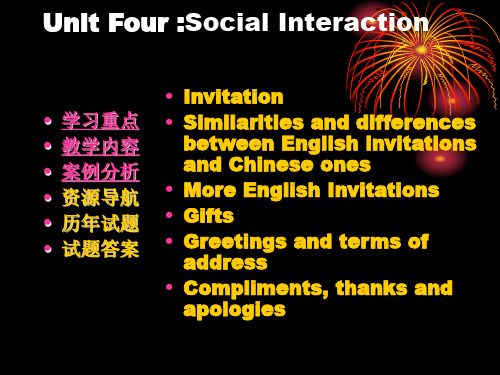
Case One: People here call me Lao Wai (old
foreigner). At first I was quite upset, I looked at myself in the mirror, I wasn’t old: I’m only in my twenties. Later, I found they also called foreign children Lao Wai or Xiao Lao Wai (little old foreigner), I realized it’s a general term for any foreigner.
6. Greetings and terms of address
• Physical greetings: • 7. Compliments, thanks and apologies • About "Thank you!": English learners take it for granted that in answering another compliments, the best way to do is to give a response of "Thank you!". However studies show that only 38.4% of Americans directly adopt this way while all the rest choose other ways to give an response. • More…
案例分析
• Case Two: When I traveled in China, I talked with many people. I knew they were friendly to me, but sometimes their questions made feel a bit uncomfortable, such as questions about my age and salary.
Cross-Cultural Communication Unit 1-4 跨文化交际(课堂PPT)

15
CHAPTER 1 - Communication and Culture: The Challenge of The Future
Dominant Culture
Co-Cultures
• It's the one in power -
• They are numerous.
control.
• Distinct and unique
• Meanwhile, aging population in more developed countries – Could bring more communication issues between older generations and younger generations (this can be treated as co-culture).
ethnic background, age, sex,
media, monetary systems,
or other factors.
etc.
16
17
• We learn our culture through proverbs
– Offer an important set of instructions
Our goal in this class is to answer some of the following questions: • Why do we often uncomfortable when encountering people who are different from yourself? • Why do people from different cultures behave in ways that seem strange to you? • How do cultural differences influence communication? • Which cultural differences are important and which are inconsequential? • Why is it difficult to understand and appreciate cultural difference?
跨文化交际--unit 4 language and culture
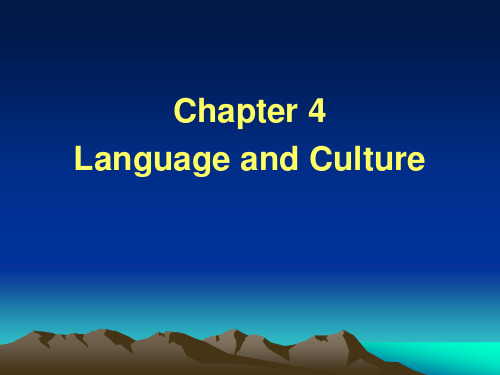
颜色词 Color Words
• White 白 – 包含white的其他习语: • the white area: an anti-revolutionary area 白区 • White Day: 白色情人节(3月14日) • white light district: ever-bright area • a white elephant: something burdensome and valueless; huge burden • show the white feather: show fear 露
颜色词 Color Wordsห้องสมุดไป่ตู้
• White 白 – 红人 • In Chinese, those who are popular and find favor with their bosses are called 红人. • In English, they are blue-eyed boys. – 白毛女 • white-haired girl
颜色词 Color Words
• White 白 – To most Chinese and Westerners, WHITE has certain similar connotations: purity, innocence, 洁白, 清白无辜.
颜色词 Color Words
• White 白 – white lie • a harmless lie 无恶意的谎言 – white man • 忠实可靠的人
颜色词 Color Words
• Red 红
– RED is the color associated with revolution and socialism (革命和社会主义). • 红卫兵 • The English word Red with a capital “R”, is often used as a synonym for a communist, usually in a derogatory sense. • 又红又专 both socialist minded and professionally qualified • 一颗红心 as loyal to the Party, having socialist virtues
跨文化交际实用教程unit4课件

Verbal Communication
Objectives
Learn the culturally loaded words Learn the cultural reflections on
ห้องสมุดไป่ตู้
proverbs Learn taboos Learn the differences in cultural thought patterns
知识分子
In CC, it refers to people including college teachers, college students, middle school teachers, and such people as medical doctors, engineers, interpreters. In EC, it refers to people of high academic status (college professors) –much smaller range of people. not always a complimentary term, sometimes used in derogatory sense.
13
Interpretations
龙--- in CC, it is a totem(图腾) with
many royal associations, 龙颜,龙 床,龙袍, 龙心大喜。 In EC, dragon refers to horrible, disgusting monsters.
14
18
the young chick duckling gosling foal calf puppy lamb fawn shoat
跨文化交际--unit 4 language and culture

颜色词 Color Words
• White 白 – 红白喜事 • weddings and funerals (婚礼和葬礼) –WHITE is the traditional color for brides (新娘) at Western weddings. To have white at funerals would be offensive; to have funerals described as happy occasions would be absolutely shocking to Westerners.
颜色词 Color Words
• Black 黑 – In both English and Chinese there are various terms indicating that black is often associated with negative qualities (负面特征): • blacklist 黑名单 • black market 黑市 • black-hearted 黑心的,恶毒的
颜色词 Color Words
• White 白 – 包含white的其他习语: • the white area: an anti-revolutionary area 白区 • White Day: 白色情人节(3月14日) • white light district: ever-bright area • a white elephant: something burdensome and valueless; huge burden • show the white feather: show fear 露
• 贾宝玉品茶栊翠庵,刘姥姥醉窝怡红院。 Jia Baoyu tastes some superior tea at Green Bower Hermitage; And Grannie Liu samples the sleeping accommodation at Green Delights. 译者在翻译原文中的”红楼梦”和”怡红 院”时没有选用red一词,而是分别译为 Golden 和Green这两个虽然不同色彩,但对译语读 者来说具有相近意义的颜色词。
跨文化交际实用教程unit4专题培训课件

Learn the culturally loaded words Learn the cultural reflections on
proverbs Learn taboos Learn the differences in cultural
thought patterns
III. Summary IV. Assignments
2
I. Warm-up cases
Case 1. Shoes for Street Walking Question : Why did the Italian shop owner
make such a blunder? Shoes for street walking. Come in and have a fit.
Comment:
Hustle---- to force sb to make a decision before they are ready or sure
-----to work as a prostitute / romance or sex is hinted
5
Case 3 Look out
8
Interpretations 龙--- in CC, it is a totem with many
royal associations, 龙颜,龙床, 龙袍, 龙心大喜。
In EC, dragon refers to horrible, disgusting monsters.
9
知识分子
In CC, it refers to people including college teachers, college students, middle school teachers, and such people as medical doctors, engineers, interpreters.
跨文化交际Unit 4(大二英语)PPT课件

Title +Surname
Neutral Relationship Surname +Title
/Situation
Title +Surname Given Name
Close Relationship /Informal Situation
Given Name
Given Name
III. Apologizing
• When to apologize • Who to apologize • How to apologize and how to respond
第20页/共39页
[Case 1] A calls B, but B doesn’t answer the Conversation 1 cal l A: Why didn’t you take upitmhe mphoenedjiuast tneowl?y. Compare the f o l l o w i n g t wo B: I just came in. I was in the office downstairs. c o n ve r s a ti ons . A: Sorr y, I should have phoned your office first.
第2页/共39页
I. Addressing
• A: Teacher Liu, could you come over to our par ty this Saturday? • A: Manager Smith, could I schedule your presentation on our new design for Friday
• Jennifer: I am really sorry for all this. • 此种情景若发生在一个中国家庭?……
Cross-CulturalCommunicationUnit1-4跨文化交际.ppt

a) Each individual are unique. b) Stereotyping. c) Objectivity. d) Communication is not a Cure-all.
CHAPTER 1 - Communication and Culture: The Challenge of The Future
• Culture is – Transmitted from generation to generation – Learned – Shared – Based on symbols – Dynamic – An intergrated system
Cross-CulturalCommunicationUnit1-4跨文化 交际
CHAPTER 1
Communication and Culture: The Challenge of The Future
CHAPTER 1 - Communication and Culture: The Challenge of The Future
– increased the probability of survival
– satisfaction for the participants in an ecological niche
– share with those who could communicate with each other and lived in the same tCommunication:
跨文化交际导论课件 第4章
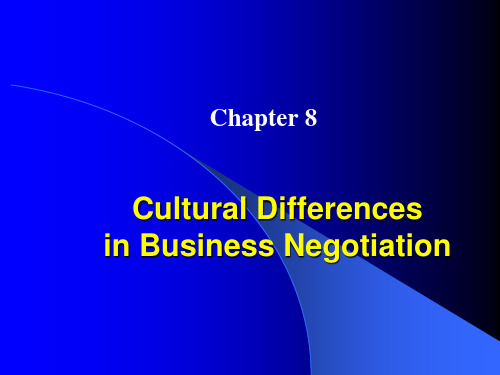
The four C’s
Common interest considers that both parties in the negotiation share, have, or want something that the other party has or does.
- in low context cultures, negotiation usually means achieving a good outcome for both parties through a discussion of the reasons and facts involved.
Informal negotiations:
e.g. you talk to your boss about the pay raise or the holidays, you contact your debtor about the overdue payment, you claim compensation to the supplier for a wrong dispatch of merchandise, you ask your subordinates to finish the work according to the scheduled timetable, etc.
Chapter 8
Cultural Differences in Business Negotiation
Outlines
I. Defining Intercultural Negotiation II. Intercultural Negotiation Variables
跨文化交际Unit 4 Verbal Communication

Age
advanced in age seasoned man mature people second childhood senior citizen
???
She has canceled all her social engagements. (1856) She is in an interesting condition. (1880) She is in a delicate condition. (1895) She is knitting little booties. (1910) She is in a family way. (1920) She is expecting. (1935)
economic crisis—depression Slum--substandard housing poor countries: less-developed nations/ emerging nations Poor--less well off/ Economically deprived/needy/disadvantaged
Unit 4 Verbal Communication
Contents
Differences in Cultural Thought Patterns Culturally Loaded Words (Connotations) Cultural Reflections on Proverbs Taboo
Absence of referent
Different Connotations
Beside the lake, beneadancing in the breeze. And then my heart with pleasure fills, And dances with the daffodils.
跨文化交际unit 4课件
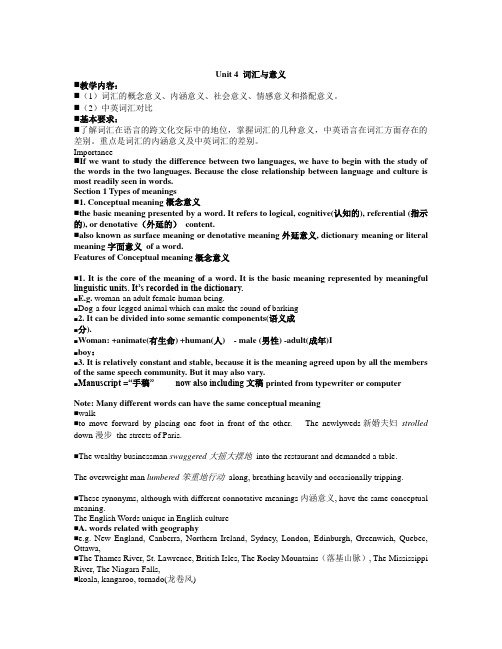
Unit 4 词汇与意义⏹教学内容:⏹(1)词汇的概念意义、内涵意义、社会意义、情感意义和搭配意义。
⏹(2)中英词汇对比⏹基本要求:⏹了解词汇在语言的跨文化交际中的地位,掌握词汇的几种意义,中英语言在词汇方面存在的差别。
重点是词汇的内涵意义及中英词汇的差别。
Importance⏹If we want to study the difference between two languages, we have to begin with the study of the words in the two languages. Because the close relationship between language and culture is most readily seen in words.Section 1 T ypes of meanings⏹1. Conceptual meaning概念意义⏹the basic meaning presented by a word. It refers to logical, cognitive(认知的), referential (指示的), or denotative(外延的)content.⏹also known as surface meaning or denotative meaning外延意义, dictionary meaning or literal meaning字面意义of a word.Features of Conceptual meaning概念意义⏹1. It is the core of the meaning of a word. It is the basic meaning represented by meaningful linguistic units. It‟s recorded in the dictionary.⏹E.g. woman-an adult female human being.⏹Dog-a four-legged animal which can make the sound of barking⏹2. It can be divided into some semantic components(语义成⏹分).⏹Woman: +animate(有生命) +human(人) - male (男性) -adult(成年)I⏹boy:⏹3. It is relatively constant and stable, because it is the meaning agreed upon by all the members of the same speech community.But it may also vary.⏹Manuscript =“手稿” now also including文稿printed from typewriter or computer Note: Many different words can have the same conceptual meaning⏹walk⏹to move forward by placing one foot in front of the other. The newlyweds新婚夫妇strolled down漫步the streets of Paris.⏹The wealthy businessman swaggered大摇大摆地into the restaurant and demanded a table.The overweight man lumbered笨重地行动along, breathing heavily and occasionally tripping.⏹These synonyms, although with different connotative meanings内涵意义, have the same conceptual meaning.The English Words unique in English culture⏹A. words related with geography⏹e.g. New England, Canberra, Northern Ireland, Sydney, London, Edinburgh, Greenwich, Quebec, Ottawa,⏹The Thames River, St. Lawrence, British Isles, The Rocky Mountains(落基山脉), The Mississippi River, The Niagara Falls,⏹koala, kangaroo, tornado(龙卷风)⏹The Great Barrier Reef, Silicon V alley, Yellowstone Park,⏹Summary:All these have their own geographical features: places, plants and animals uniquely found in USA, Great Britain and Australia; They all represent meaning unique in their own cultures;Their Chinese equivalents are only used by the Chinese people as mere names, which have lost their distinctive geographical and cultural features.The English Words unique in English culture⏹A. words related with geography⏹e.g.⏹U.S.A: New England, The Rocky Mountains,The Mississippi River, The Niagara Falls,Y ellowstone Park, Silicon V alley⏹Britain: British Isles, Northern Ireland, London, Edinburgh, Greenwich, The Thames River, Rose⏹Canada: Ottawa, Quebec, St. Lawrence,⏹Australia: Canberra, Sydney, The Great Barrier Reef, koala, kangaroo⏹B. words and history⏹the May Flower⏹(the ship in which a group of⏹British Puritans who were also⏹known as pilgrim fathers sailed to⏹America in 1620.⏹The revolutionary war⏹( the struggle of the 13 colonies in North America for independence from the British rule between 1775-1783)⏹Scalp(头皮)⏹(to tear the skin on the top and back of head and the hair attached from an enemy by an North American Indian as a trophy战利品)⏹⏹Knight⏹(a man given the rank of knighthood by the British Monarch in recognition of merits in public service)⏹Hippy/Hippie⏹(a young man and young woman who rejects authority, existing institutions and conventional attitudes towards morality, style of dress, etc.)⏹C. word and politics⏹USA: President, Secretary, Congress, Senate, the House of Representatives, The Democratic Party, The Republican Party, the Supreme Court⏹Great Britain: Parliament议会:the supreme legislative body of the United Kingdom. It comprises the sovereign, the House of Lords and the House of Commons.议会两院尤指英国由上议院和下议院构成的国家立法机关; Prime Minister, The Conservative Party, The Labour Party, Supreme Court of Judicature司法⏹Governor行政长官⏹the official title of the representative of the British monarch in a British colony.⏹Governor general总督⏹the personal representative of the British crown in the independent nations of the commonwealth.⏹e.g. The Canadian Governor General⏹Constitutional monarchy君主立宪制⏹a monarchy in which the powers of the rulers are restricted to those granted under the constitution and laws of the nationD. words and religion⏹Bible⏹a collection of religious books comprising the Old Testament and New Testament⏹reformation:宗教改革⏹a 16th century religious movement against the abuses in the Roman Catholic Church, ending in the formation of Protestant Churches.⏹Christmas box耶诞礼物或礼金⏹money given at Christmas time to the dustmen and others who provide a service throughout the year.⏹Boxing day节礼日⏹the first week day after Christmas, a legal holiday in England⏹Easter⏹the chief Christian feast, which celebrates the Resurrection of Christ, on the first Sunday after the full moon that coincides with or comes after the spring equinox.E. words and HolidaysChristmas cake/pudding/card/tree/carol/stockingFather Christmas), Santa Claus(A)⏹F. words and currency⏹Pound, penny; the American dollar, cent, quarter, nickel⏹G. Words and law⏹Court, judge, jury, lawyer, attorney (A)⏹H. Words and way of life⏹Snack Bar, roast beef, hamburger, sandwich, barbecue, cocktail, champagne; pajamas, suite, dress; subway, Greyhound bus; drive-ins, diner,⏹I. words and sports⏹Football, soccer, rugby, hockey, cricket⏹J. words and sex⏹Striptease, sex store, sexual interference, prostitute, whorehouse⏹K. words and personality⏹GB: reserve, practical, insularism偏执⏹USA:individualism, rapid pace of life, direct, promptness, informality, originality, materialism English works partly corresponding with Chinese words in conceptual meaning⏹1. Intellectual--知识分子⏹2. social sciences--社会科学⏹3. drugstore--药店⏹[美]杂货店(出售药物、糖果、饮料,化妆品,杂志及其他杂物的店铺)⏹4. Morning=午夜+凌晨+黎明+早晨+上午⏹5. Y oung(18-40), middle-aged(40-60), old (over 60)-------老中青⏹Discussion: discuss the conceptual differences between the words in each pair⏹yard--院子⏹peasant--农民⏹idealist-唯心主义者⏹materialist--唯物主义者"family" and jiating (家庭)⏹An American (A) attended her Chinese friend's (B) wedding. Two years later, the two met again.⏹A: Have you started a family'!⏹B: Oh, yes. Y ou attended my wedding, remember?⏹A: I mean if you've had children.⏹Here we see that ' family' means more than jiating (家庭) ,though they seem to be equivalents.2. Connotative meaning内涵意义⏹the implication(含义,暗示)of words, apart from its primary meaning.It is the communicative value that an expression has in addition to the purely conceptual meaning. It varies from culture to culture and from individual to individual⏹E.g. Woman⏹Physical: biped(双足的), having a womb(子宫)⏹Personality: gentle, compassionate, sensitive, hard-working, frail脆弱的, emotional, prone to tears, irrational, inconstant变化无常的,subject to maternal instinct, behavior: capable of speech, experienced in cookery, skirt or dress wearing,⏹Dog⏹loyal to owner, fierce凶猛的, violentFeatures of Connotative meaning内涵意义⏹1. Despite cultural background difference, some corresponding words in two languages may convey the same connotative meaning. e.g tiger, 老虎--cruelty⏹E.g. Woman⏹2. words with the same conceptual meaning yet different connotative meaning⏹书, book⏹老,old⏹同志,comrade⏹宣传,propaganda⏹狗,dogConnotative meanings vary according to different people, times, ages, societies etc.⏹E.g. Home: warm, loving, comfortable, safe⏹like a prison, cold, boring⏹终身大事⏹工作?事业?婚姻? 生死?⏹Connotative meaning may change with the times going⏹E.g. traditional: positive in the past⏹―old, conservative‖ at present⏹3. Social meaning社会意义⏹Social meaning is what a piece of language conveys about the social circumstances of its use, such as the language users( who are using the language), settings (where is language used), topics (what are language users are talking or writing).⏹E.g⏹home (general) , residence (formal), domicile(law), abode (literature),⏹horse, steed(战马), nag(老马),gee-gee(child)⏹throw(general) , cast (literature and religious), chuck(slang)⏹salt, sodium chloride⏹disobedient, recalcitrant反抗的⏹A good selection of words is important.Exercise!⏹Words which stand for what people do in order to make a living: job, vocation, profession, occupation, career, trade, work⏹Profession (an occupation requiring special education, especially in the liberal arts or sciences)所指的职业是需要在文科或理科方面有一定的教育程度,具备一定理论水平的人才的职业。
跨文化交际 Unit4(课堂PPT)
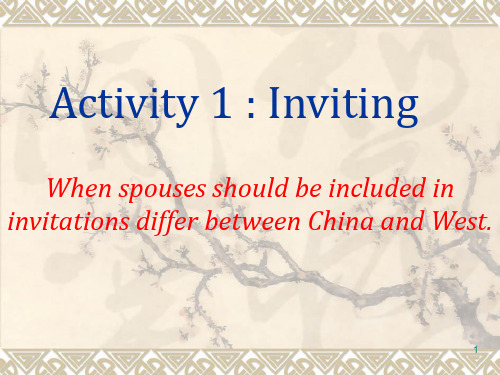
Activity 2 :Footing the bill
早在15世纪,人们便开始使用“foot the bill”这个短
语,但当时指的是把所有的帐目加起来算 出总金额,然后写在帐单的底部(foot of bill or account),foot的意思相当 于bottom。
很显然,这是店家的工作,没消费者什么事。但是 到了19世纪,则轮到消费者"foot the bill"了,因为
14
Be sure to avoid:
◆ Giving clocks as gifts ◆ Colors such as white or black ◆ Number four ◆ Sharp objects such as knives, letter openers, or scissors ◆ Giving gifts in odd numbers ◆ Do not brag about your gift in front of the recipient. ◆ A fine writing pen would be a good gift, unless it has red ink.
22
Activity 4:
23
Chinese never accept offer of drinks or food; westerners do not press their guests to drink or eat.
In China, if a guest is invited to a home, the host will normally serve the guest with some hot tea, and often when the host is making tea, the guest will ask the host not to bother to do so. Even so the host will provide tea for the guest. The behaviour of the host in actively offering and the guest in asking the host not to bother have become conventional and habitual, and are understood as showing politeness and courtesy.
- 1、下载文档前请自行甄别文档内容的完整性,平台不提供额外的编辑、内容补充、找答案等附加服务。
- 2、"仅部分预览"的文档,不可在线预览部分如存在完整性等问题,可反馈申请退款(可完整预览的文档不适用该条件!)。
- 3、如文档侵犯您的权益,请联系客服反馈,我们会尽快为您处理(人工客服工作时间:9:00-18:30)。
- Watchdog (舆论监督) - Love me, love my dog. (爱屋及乌) - Every dog has his day. (凡人皆有得意日) - Be faithful as a dog - I am too old a dog to learn new tricks. (行家里 手) - He is top dog in the office. (头儿)
Reading I How Is Language Related to Culture
Language reflects the environment in which we live. (snow, wine) Language reflects cultural values. (time) In ICC or translation: do dictionaries always help? We translate concepts from a foreign language and culture with words that fits our priorities. e.g.: dog Identical words with rather different meanings: administration, manager/director, force majeure (不 可抗力)
“Language-and-culture” in the five dimensions of culture
Language and cultural products Language and cultural practices Language and cultural perspectives Language and cultural communities Language and persons
Case Study 14
Version 1: the literal translation strategy faithful to the original but easy to confuse the readers in the target language Version 2: the liberal translation strategy attempting to convey the original meaning as precisely as possible but losing the original poetic flavor (the rhetoric device — pun — is not reproduced)
grammatical rules? Language = neutral codes and
We make cultural choices when we select words, form sentences and send a message. All languages have social questions and information questions. social questions ---- a lubricant to move the conversation forward information questions ---- asking for information Words in themselves do not carry the meaning. The meaning comes out of the context, the cultural usage.
Connotations of animal words
壮如牛 犟牛 蠢猪 拦路虎 河东狮 母夜叉 落汤鸡 胆小如鼠 一丘之貉
as strong as a horse as stubborn as a mule as stupid as a goose a lion in the path old gray mare an absolute dragon a drowned rat chicken-hearted birds of the same feather
“Why time flies?” “Because somebody wants to kill it.” “你有什么了不起,能把我吃了!” “不能,我是回民!” 外甥打灯笼照(舅)旧 as before; as usual; as of old 狗撵鸭子呱呱叫 very good
Reading I How Is Language Related to Culture
Communication across cultures and languages is difficult and full of hurdles and pitfalls. Even if two people from different cultures can speak a common language, they may misinterpret the cultural signals. The result is confusion and misunderstanding.
Reading II Language-and-Culture, Two Sides of the Same Coin
“Language-and-culture” Language and culture are clearly fused; one reflects the other. Language is a product of culture, but it also plays a distinct role. Language is a window to the culture.
Idiom Translation
lick somebody‟s boots: sit at somebody‟s feet. have a big mouth a piece of cake carry coals to Newcastle at sixes and sevens the pot calling the kettle castles in Spain 守口如瓶 雷声大,雨点小 大海捞针
More examples
恋爱“三草”原则: 女:你说你很寂寞,为什么不去找你以前的女朋友而来追我 呢? 男:好马不吃回头草!(A good horse will never turn round to graze on an old pasture.) 女:你们班上也有女孩呀!我们俩相隔这么远,为何来追我 呢? 男:兔子不吃窝边草!(A rabbit doesn„t nibble the grass near its own hole.) 女:那你现在为什么又要抛弃我呢?你这个混蛋! 男:天涯何处无芳草!(There are plenty of fish in the sea.)
பைடு நூலகம்
拍马屁 寄人篱下 夸夸其谈 小菜一碟 画蛇添足 乱七八糟 五十步笑百步 白日做梦 button one‟s lip much cry and little wool look for a needle in a hay stack
Unit 4
Language and Culture
Pun:
Warm Up
amusing use of a word or phrase that has two meanings, or of a word with the same sound but different meanings Things like puns defy translation across languages.
Reading I How Is Language Related to Culture
Language lives, and it changes over time. Words and phrases that are used commonly at one time may be discontinued or their meaning may change overtime. “gay” purity of a language A language, if spoken in different parts of the globe, ultimately develop differently. “Englishes”
More examples
More examples
I am sorry. I am sorry, too. I am sorry three. What are you sorry for (four)? I am sorry five.
Reading I How Is Language Related to Culture
Reading I How Is Language Related to Culture
打落水狗, 斗鸡走狗, 狗恶 酒酸, 狗吠不惊, 狗急跳墙, 狗头军师, 狗血喷头, 狗眼 看人, 狗仗人势, 狗嘴里吐 不出象牙, 挂羊头、卖狗肉, 关门打狗, 狐朋狗友, 鸡鸣 狗吠, 嫁鸡随鸡、嫁狗随狗, 狼心狗肺, 鼠窃狗盗, 偷鸡 摸狗, 指鸡骂狗, 猪卑狗险, 狗皮膏药, 狗走狐淫, 丧家 之狗, 狗行狼心, 狗胆包天, 关门打狗
